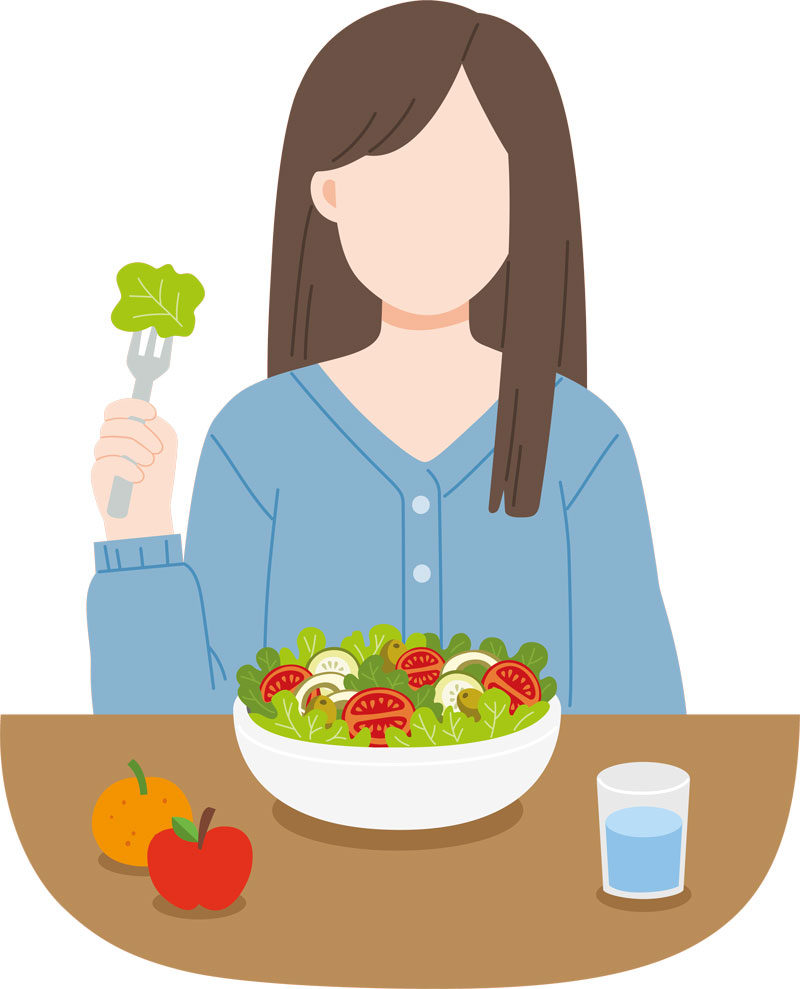Healthy eating
A small amount of fat is an essential part of a healthy, balanced diet. Fatty acids such as Omega 3 are considered essential because the body cannot make them itself.
Fat helps the body absorb fat-soluble vitamins, like A, D, E and K.
Any fat not used by the body’s cells of for energy processes is converted into body fat. Frequently eating more than you need -whether it’s from fat, carbohydrate or protein-increases the risk of becoming overweight or obese.
All types of fat are high in energy, a gram providing 9kcal (37kJ) of energy (as opposed to the 4kcal (17kJ) for carbohydrates and proteins).
There are 3 main types of fat and most foods contain a mixture of them:
1) Saturated fat
Saturated fats mainly derive from animal sources such as meat and dairy, although some can be found in plant foods such as palm and coconut oil.
Too much saturated fat in your diet can raise low density lipoprotein (LDL) cholesterol in the blood. This can lead to fatty deposits developing in the arteries, these can restrict the flow of blood to the heart and brain which increases the risk of heart disease and stroke.
Cutting down on saturated fat is one way to reduce the risk of heart disease, stroke and other cardiovascular diseases. However, other risk factors that should be considered include eating too much salt and sugar, being overweight, smoking, drinking alcohol in excess and insufficient exercise.
2) Trans fat
Trans fats are found naturally in some animal produce like meats and cheese, though they may be produced through the frying process of vegetable oils (hydrogenated oil).
Like saturated fats, trans fats can raise cholesterol levels in the blood; however, trans fats tend to make up a much smaller part of our diet.
3) Unsaturated fat
Unsaturated fats are found primarily in oils from plants, and can be either polyunsaturated or monounsaturated.
There is good evidence that replacing saturated fats with unsaturated fats can help lower cholesterol.
Monounsaturated fats help protect our cardiovascular system by maintaining levels of High density lipoprotein (HDL) cholesterol and reducing levels of LDL cholesterol. HDL cholesterol helps transport cholesterol from parts of the body where there is too much of it, to the liver, where it is disposed of. Foods that contain monounsaturated fats include olives, avocados and some nuts.
Polyunsaturated fats include omega-3 and omega-6. Omega-3 fats are found in oily fish such as sardines, mackerel and fresh tuna. Omega-6 fats are found in vegetable oils including corn, sunflower and some nuts.
While most of us get sufficient omega-6 recurring advice is to eat more omega-3 by eating at least two portions of fish a week, one of which should include an oily fish.
Too much fat in your diet, particularly saturated fats, can raise your cholesterol and increase the risk of heart disease.
As part of a healthy diet, it is important to cut down on foods and drinks high in saturated fats and trans fats; try to replace some of them with unsaturated fats.
Advice
- Try to buy lean cuts of meat, or compare nutrition labels on meat packaging.
- Trim visible fat and take skin off meat before cooking.
- Choose low-fat dairy products, such as 1% fat milk or reduced-fat cheese.
- Choose reduced-fat spreads, such as olive oil or sunflower spreads.
- Grill, bake, poach or steam food rather than frying or roasting.
- Measure oil with a tablespoon or use an oil spray, instead of pouring straight from a container.
- Spoon off excess fat and oil from any roasts, casseroles, stews or curries.
- Try using vegetables, beans or lentils in casseroles and stews and curries, and a bit less meat.
- When making sandwiches, try leaving out the butter or spread:, particularly if you are using a moist filling.
Remember to check food labels
Read the nutritional information to see how much fat your food product contains. Remember the different types of fat and saturated fat is the unhealthiest; look for “Saturates” or “sat fat” figures in the nutrition label to see how much fat the product contains for every 100g:
- More than 5g of saturated fat per 100g is high
- 1.5g of saturated fat or less per 100g is low
Please discuss your concerns about eating plans or weight loss with your GP on 20052441 who can refer you to the dietitians.


